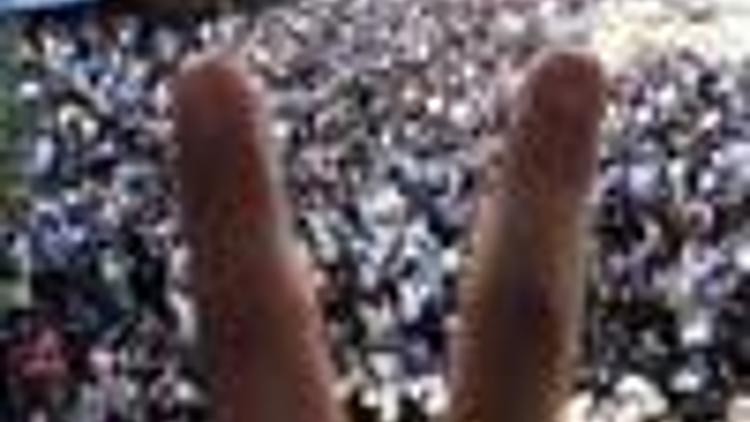Iran opposition plans day of mourning after protest deaths
Güncelleme Tarihi:

TEHRAN – Iran’s opposition plans a day of street marches and mourning on Thursday for protesters killed in post-election violence, keeping up the pressure on the Islamic regime over the disputed vote.
Facing their biggest crisis since the 1979 revolution, the country’s Islamic rulers have gone on the offensive, arresting protesters and prominent reformists, tightening their grip on the media and lashing out at "meddling" by foreign foes, including the United States.
Despite the crackdown, defeated presidential candidate Mir Hossein Mousavi has called on his supporters to take the streets again on Thursday dressed in black in a sign mourning for protesters slain in post-election clashes.
Tens of thousands of people joined what was billed as a "silent" protest rally on Wednesday, wearing green wrist and head-bands in the color of Mousavi’s campaign and carrying banners accusing re-elected President Mahmoud Ahmadinejad of having "stolen" their votes in Fridays poll, witnesses said.
State television broadcast brief footage of the rally, which was staged despite an official ban on such gatherings. The foreign media is barred from covering such events under restrictions imposed since the wave of public anger took hold in Iran, exposing deep divisions in the oil-rich nation.
At least seven people have been killed and many more wounded in the worst violence for at least a decade, with protests reported not only in Tehran but also spreading to other major cities across the country since polling day.
Supreme leader Ayatollah Ali Khameini said he would consider a partial recount of the election that brought Ahmadinejad back to power in a landslide, after his defeated rivals lodged formal complaints of vote-rigging.
But Mousavi on Wednesday repeated his demand for the results of the election, which he branded a "shameful fraud", to be annulled and a new vote called.
World governments have raised concern about the situation in Iran, particularly the police violence and widespread arrests, with some also European leaders publicly speaking of fraud and vote irregularities.
The authorities, warning they would crush any "velvet revolution," have rounded up scores of people in Tehran and other cities, including prominent reformists and even former government officials.
In the latest sweep, Iran arrested on Wednesday Ebrahim Yazdi and Mohammad Tavasoli, veteran revolutionaries and leaders of Iran’s Liberation Movement, the Etemad Melli newspaper reported.
Unofficial reports said the elderly Yazdi had been detained at a hospital emergency unit.
In a sign of cracks emerging within the Iranian elite, a number of influential clerics -- including a dissident once tipped as a potential successor to revolutionary leader Ruhollah Khomeini -- have spoken out about the election results and the subsequent crackdowns.
Mousavi and reformist former president Mohammad Khatami, who was succeeded by Ahmadinejad in 2005, issued a joint letter on Wednesday urging the Iranian authorities to release those arrested and halt the violence.
"We ask you to take all the necessary measures to put an end to today’s worrying situation, to stop the violent actions against people and to free those arrested," said the letter published on his Mousavi’s website.
The media watchdog Reporters Without Borders said a dozen Iranian journalists and bloggers have been arrested and many others have gone into hiding.
Iran has fought back against the international outcry, on Wednesday summoning the Swiss ambassador, who represents US interests in Iran, to protest at what it called "interfering remarks" by US officials, state television said.
US President Barack Obama, who has called for dialogue with Iran after three decades of severed ties, has voiced "deep concerns" about the aftermath of the election but said it would not be productive to be seen as "meddling."
In new measures against the media, Iran’s elite Revolutionary Guards told websites to delete material that "creates tensions" or face legal action, and issued a new warning to the foreign media, accusing some outlets of becoming the "mouthpiece of the rioters’ movement."
Pictures, videos and updates from the streets of Iran continue to pour in to social-networking and image-sharing websites such as Twitter, Facebook, YouTube and Flickr despite Iranian efforts to cut off mobile phones and the Internet.
Sometimes jumpy footage broadcast on the Internet from amateur videos has shown chaotic and sometimes brutal scenes of violence, with police beating protestors and one image purportedly showing a protestor shot dead during massive street protests on Monday.
The combative Ahmadinejad -- who set Iran on a collision course with the West during his first four-year term -- remained defiant, saying his victory showed faith in his government of "honesty and service to the people."
Khamenei, who has the final say on all matters of state, said he was asking the Guardians Council, a 12-member body made up of jurists and clerics, to examine the complaints of irregularities.
The council said it had invited Ahmadinejad’s three challengers to set out their grievances on Saturday, with a decision about any possible recount on Sunday.

